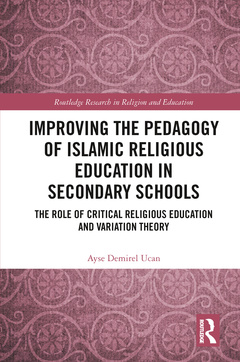Improving the Pedagogy of Islamic Religious Education in Secondary Schools The Role of Critical Religious Education and Variation Theory Routledge Research in Religion and Education Series
Auteur : Ucan Ayse Demirel

This timely book focusses on the central issues and questions which emerge in relation to the teaching and learning of Islam in confessional and constructivist religious education. Considering the consequences of a lack of diversity in the Islamic Religious Education curriculum, the text also explores the challenges faced by Muslim pupils in connection with secularism and radical Islam.
Through rich analysis of research carried out across Muslim and public secondary schools in the UK, this book develops a meaningful pedagogy of Islamic Religious Education. In particular, the volume investigates the benefits of Critical Religious Education and Variation Theory frameworks on student learning in Religious Education classrooms and illustrates how these didactic frameworks can help to ameliorate distinct problems seen across Islamic Religious Education. Chapters identify discrete pedagogical issues that arise in the confessional and constructivist approaches to Islamic Education, such as students? difficulties in relating to concept of Islam, and progressive approaches taken in public schools. In addressing these, the text proposes a new theoretical and pedagogical approach to the teaching of Islam, which draws on the philosophy of Critical Realism, the theories of Critical Religious Education, and Variation Theory.
This book will be of great interest to postgraduate students, researcher scholars and academics in the fields of religion and education and Islamic studies. In addition, it will be of interest to social equity professionals and public policy decision makers.
List of tables
Acknowledgements
Chapter 1
Introduction
Problems of teaching Islam in confessional and constructivist religious education
Absence of diversity in the Islamic Religious Education curriculum
A new theoretical and pedagogical approach to Islamic Religious Education
The aim of the study
Structure of the book
Chapter 2
Critical Realism and Islam
Critical Realism
Religion, God and Critical Realism
Critical Realism as applied to Islam
Critical Realism as ‘underlabouring’ Islamic Religious Education
Chapter 3
Applying the Framework of Critical Religious Education and Variation Theory to Islamic Religious Education
Critical Religious Education
Phenomenography
Variation Theory
Learning Study Model
Chapter 4
Research Methodology
Research Approach
Implementaion of learning studies
Sampling of research participants
Data collection tools
Data analysis
Ethical considerations and trustworthiness of the study
Reflexivity
Chapter 5
Implementation of Critical Religious Education and Variation Theory in RE lessons: A learning study on ‘Islam and being a Muslim’
The first lived object of learning
The intended object of learning
The enacted object of learning
The second lived object of learning
Chapter 6
Implementation of Critical Religious Education and Variation Theory in RE lessons: A learning study on ‘equality in Islam’
The first lived object of learning
The intended object of learning
The enacted object of learning
The second lived object of learning
Chapter 7
RE teachers’ pedagogical perceptions and practices before and during the learning study
Theoretical background
Themes
Chapter 8
Discussion and Conclusion
Summary and discussion of the findings
The theoretical and pedagogical implications for Islamic Religious Education
Limitations of the study
Future research
Concluding remarks
Appendices
Index
Ayse Demirel Ucan is Researcher in the Religious Education Department at Marmara University, Turkey.
Date de parution : 03-2021
15.2x22.9 cm
Date de parution : 08-2019
15.2x22.9 cm
Thèmes d’Improving the Pedagogy of Islamic Religious Education in... :
Mots-clés :
Critical Religious Education; Inter Faith; Islamic religious education; Phenomenographic Research Tradition; religious education; Transform Content Knowledge; Ayse Demirel Ucan; Indian Ethnic Backgrounds; teaching and learning; Today’s UK; Muslim World; variation theory; Ultimate Truth Claims; learning study model; Ire; critical realism; Professional Development; Muslim learners; Judgmental Rationality; religious literacy; Knowledge Acquisition; phenomenographic analysis; Boko Haram; Phenomenographic Studies; Ire Teacher; Pedagogical Content Knowledge; Alethic Truth; Phenomenographic Research; Pedagogical Perceptions; Epistemic Relativism; Muslim Pupils; Secular Worldviews; Teacher’s Pedagogical Beliefs; Phenomenographic Research Approach



